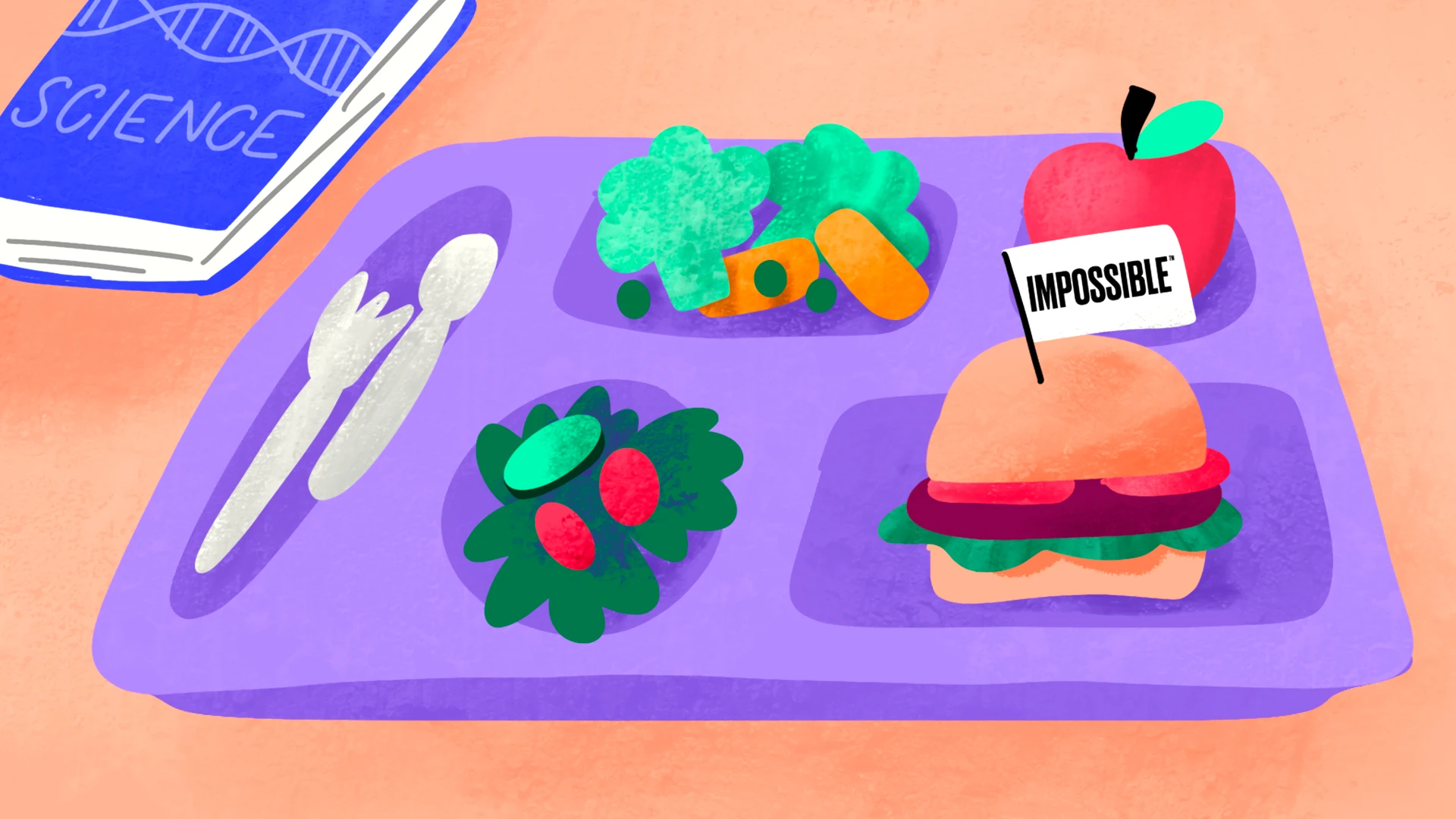Impossible Foods’ Child Nutrition label supports schools participating in School Lunch and Breakfast Programs
By Sue Klapholz, M.D., Ph.D., Vice President of Nutrition, Health & Food Safety at Impossible Foods & Esther Park, MPH, RD, Senior Nutrition and Health Scientist at Impossible Foods

At Impossible Foods, we want to empower people of all ages to make dietary choices that are good for them and good for the planet. That means making our products available everywhere people go for food. For kids, that often includes schools. Serving nearly 5 billion lunch meals and at least 2.4 billion breakfasts per year in the US (ref(opens in a new tab), ref(opens in a new tab)), schools play an especially important role in shaping children’s dietary patterns. Recently, the Impossible™ Burger received the Child Nutrition (CN) Label(opens in a new tab), which is a voluntary food crediting statement authorized by the USDA. CN labels make it easier for schools participating in federal Child Nutrition Programs(opens in a new tab), including the National School Lunch Program(opens in a new tab) and School Breakfast Program(opens in a new tab), to determine how much a particular food contributes to federal meal pattern requirements for nutritionally balanced meals for children each school day.
Balanced nutrition is critical during childhood and adolescence to ensure healthy growth and development (ref(opens in a new tab)). Eating a variety of nutrient-dense foods -- such as fresh vegetables and fruits, whole grains, and good sources of protein -- is the best way to ensure that kids are getting all the nutrients they need. While Impossible™ products aren’t substitutes for whole foods like vegetables and fruits, offering them in place of their animal meat counterparts in schools has major benefits for the health of the planet, while also contributing to nutritional balance in kids' meals.
Impossible Foods’ products are packed with nutrients, including high-quality soy protein(opens in a new tab) -- the only plant-based protein that rivals animal meat for protein quality (ref(opens in a new tab)). A 4oz serving of the Impossible Burger contains 19g of protein, 14g of total fat, and 3g of dietary fiber, an under-consumed nutrient in the US (ref(opens in a new tab)) and one that is missing from animal-based meats. The Impossible™ Burger is also a good source of other nutrients that are under-consumed in the American diet, such as potassium, calcium, and iron (ref(opens in a new tab)). Additionally, Impossible™ Burger is a good source of essential nutrients like zinc and B vitamins.
For kids and teens, protein provides the building blocks and energy needed for growth during these life stages and dietary fiber intake can help decrease risk for digestive issues as well as chronic diseases, like heart disease and diabetes, later in life. Potassium plays many important roles in the body, including aiding proper muscle function and protecting heart health for individuals of all ages. Calcium is essential for the accrual of bone mass that occurs during youth and decreases risk for bone fractures later in life. Finally, ensuring adequate iron intake among children and adolescents is critical. Iron deficiency anemia, the most common micronutrient deficiency seen worldwide, has severe health impacts particularly for pregnant women, infants, and children.
Dietary patterns and preferences established during childhood and adolescence have a huge impact on long-term health (ref(opens in a new tab)). Compared with previous decades, today’s youth experience a higher prevalence of high blood pressure, high cholesterol and impaired glucose tolerance, conditions which can then lead to chronic diseases such as coronary heart disease and type 2 diabetes (ref(opens in a new tab), ref(opens in a new tab)). In addition to genetic and environmental factors, the main risk factors for these and other chronic diseases are diet and activity level. Schools can play an influential role by offering children and adolescents the opportunity for exercise and balanced, nutrient-dense meals.
There are also myriad public health reasons to welcome plant-based protein choices into our children’s diets (ref(opens in a new tab)). Animal agriculture is a major contributor to food-borne illness caused by pathogens present on animal carcasses. Young children are particularly vulnerable to these diseases (ref(opens in a new tab)). In addition, feeding antibiotics to animals throughout their life cycles is a major contributor to the rise of difficult-to-treat multiple-antibiotic resistant pathogens. Finally, animals in the confines of factory farms are the perfect breeding ground for viral pandemics. Influenza is an example of a virus that can spread and recombine in pig and poultry populations, and then infect humans (ref(opens in a new tab)).
Including Impossible™ products in school menu choices has benefits that go beyond individual nutrition and health. The next generation depends on the health of our planet, and young people care deeply about the earth and their power to save it (ref(opens in a new tab)). The devastating effects of climate change include sea level rise, increasing ocean temperatures and intense droughts, which threaten people, crops and wildlife (ref(opens in a new tab)). Deforestation to clear land for raising livestock and overfishing have catastrophic ongoing effects on species diversity and numbers (ref(opens in a new tab)). Impossible Burger uses 96% less land and 87% less water, generates 89% less of the greenhouse gases that cause global warming, and produces 92% less aquatic pollutants(opens in a new tab) than ground beef from cows. By choosing plant-based options for their school meals, kids are creating a better future for themselves and for the planet.